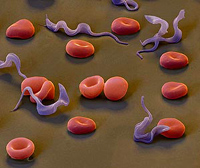•
Machado Home
• Research
Fig Mutualism
Drosophila
Trypanosoma
• People
• Publications
• Teaching
• Links
• Research
opportunities and contact information |
Trypanosoma
cruzi Research
One of our long-standing interests is the study of human parasite evolution, with a focus in Trypanosoma
cruzi, the agent of Chagas’
disease. 
We have studied the evolutionary history of Trypanosoma cruzi and other Trypanosomatids using population genetic and genome sequence data. Although T. cruzi mainly reproduces clonally, results from our lab and others have shown that hybridization events have occurred during its recent evolutionary history. We have used comparative genomic data to show that inferred genome-wide signals of positive selection are higher in T. cruzi proteins than in Leishmania spp. proteins, a result consistent with the greater versatility of T. cruzi in its host range, cell tropism and cell invasion mechanisms. Currently, we are using comparative genomic data to study the dynamics of gene duplication in Trypanosomatid genomes, and we are conducting phylogenetic studies of T. cruzi populations from the Southwestern United States and Northern Mexico. |

